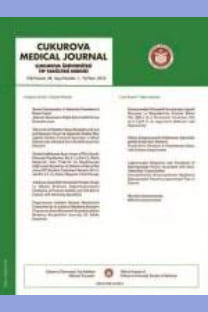Kuzey Kıbrıs’taki tıp fakültesi öğrencilerinin ruhsal bozukluklara yönelik tutumları
tıp öğrencisi, ruhsal sağlık, tutum, damga
Attitudes of medical faculty students in Northern Cyprus towards mental illnesses
medical student, mental health, attitude, stigma.,
___
- 1. Bourgeois JA.Academic psychiatry: an international, innovative speciality. Acad Psychiatry 2011;35: 349-53.
- 2. Mukherjee R, Fialho A, Wijetunge, A, Checinski K, Surgenor T. The stigmatisation of psychiatric illness-the attitudes of medical students and doctors in a London teaching hospital. Psychiatrist 2002;26:178-81.
- 3. Givens JL, Tija J. Depressed medical students’ use of mental health services and barriers to use. Acad Med. 2002;77:918-21.
- 4. Ay P, Save D, Fidanoglu O. Does stigma concerning mental disorders differ through medical education? A survey among medical students in Istanbul. Soc Psychiatry Psychiatr Epidemiol 2006;41:63-7.
- 5. Schulze B. Stigma and mental health professionals: A review of the evidence on an intricate relationship. International Review of Psychiatry. 2007;19:137-55.
- 6. Arikan K, Uysal, O. Emotional reactions to the mentally ill are positively influenced by personal acquaintance. Isr J Psychiatry Relat Sci. 1999;36:100-4.
- 7. Ogunsemi, O, Odusan O, Olatawura M. Stigmatising attitude of medical students towards a psychiatry label. Ann Gen Psychiatry. 2008;25:7-15.
- 8. Fernando S, Deane F, McLoed H. Sri Lankan doctors’ and medical undergraduates’ attitudes towards mental illness. Soc Psychiatry Psychiatr Epidemiol. 2010;45:733-9.
- 9. Lyons Z. Attitudes of medical students towards psychiatry, and to psychiatry as a career: a systematic review. Acad Psychiatry. 2012;37:150-7.
- 10. Hirai M, Clum GA. Development, reliability, and validity of the beliefs toward Mental Illness Scale. J Psychopathol Behav Assess. 2000;22:221-36.
- 11. Bilge A, Cam O. Ruhsal hastalığa yönelik inançlar ölçeğinin geçerliliği ve güvenilirliği. Anadolu Psikiyatri Derg. 2008;9:91-6.
- 12. Angermeyer MC, Dietrich S. Public beliefs about and attitudes towards people with mental illness: a review of population studies. Acta Psychiatr Scand. 2006;113:163-79.
- 13. Shokoohi-Yekta M, Retish PM. Attitudes of Chinese and American male students towards mental illness. Int J Soc Psychiatry. 1991;37:192-200.
- 14. Al-Adawi S, Dorvlo AS, Al-Ismaily SS, Al-Ghafry DA, Al-Noobi BZ, Al-Salmi, A, et al. Perception of and attitude towards mental illness in Oman. Int J Soc Psychiatry. 2002;48:305-17.
- 15. Unal S, HisarF, Celik B, Ozguven Z. Üniversite öğrencilerinin ruhsal hastalığa yönelik inançları. Düşünen Adam Psikiyatri ve Nörolojik Bilimler Dergisi. 2010;231:145-50.
- 16. Angermeyer MC, Matschinger H. Social distance towards the mentally ill: results of representative surveys in the Federal Republic of Germany. Psychol Med. 1997;27:131-41.
- 17. Calvert SH, Sharpe M, PowerM, Lawrie SM. Does undergraduate education have an effect on Edinburgh medical students’ attitudes to psychiatry and psychiatric patients? J Nerv Ment Dis. 1999;187;757-61.
- 18. Savrun, BM, Arıkan, K, Uysal O, Çetin G, Poyraz, BC, Aksoy C et al. Gender effect on attitudes towards the mentally ill: A survey of Turkish University students. Isr J Psychiatry Relat Sci. 2007;44:57-61.
- 19. Link BG, Phelan JC, BresnahanM., Stueve A, Pescosolido, BA. Public conceptions of mental illness: labels, causes, dangerousness, and social distance. Am J Public Health. 1999;89:1328-33.
- 20. Farina A. Are women nicer people than men? Sex and the stigma of mental disorders. Clin Psychol Rev. 1981;1:223-43.
- 21. Baxter H, Singh SP, StandenP, Duggan C. The attitudes of tomorrow’s doctors towards mental illness and psychiatry: changes during the final undergraduate year. Med Educ. 2001;35:381-83.
- 22. Yanik M, Simsek Z, Kati M, Nebioglu M. Tıp fakültesi öğrencilerinin depresyona karşı tutumları ve psikiyatri eğitiminin bu tutumlara etkisi. 3P Dergisi. 2004;12:101-7.
- 23. Arkar H, Eker D. Influence of a 3-week psychiatric training programme on attitudes toward mental illness in medical students. Soc Psychiatry Psychiatr Epidemiol. 1997;32:171-6.
- 24. Ighodaro A, Stefanovics E, Makanjuola V, Rosenheck R. An assesment of attitudes towards people with mental illness among medical students and physicians in Ibadan, Nigeria. Acad Psychiatry 2014; doi:10.1007/s40596-014-0169-9.
- 25. O' Connor K, Brennan D, O' Loughlin K, Wilson L, Pillay D, Clarke M, et al. Attitudes towards patients with mental illness in Irish medical students. Ir J Med Sci. 2013;182:679-85.
- 26. Fischel T, Manna H, Krivoy A. Lewis M, Weizman A. Does a clerkship in psychiatry contribute to changing medical students’ attitudes towards psychiatry? Acad Psychiatry. 2008;32:147-50.
- 27. Muga F, Hagali M. What do final year medical students at the University of Papua New Guinea think of psychiatry? P N G Med J. 2006;49:126-36.
- 28. Adewuya AO, Oguntade AA. Doctors’ attitude towards people with mental illness in Western Nigeria. Soc Psychiatry Psychiatr Epidemiol. 2007;42:931-6.
- 29. Fan C. A comparison of attitudes towards mental illness and knowledge of mental health services between Australian and Asian students. Community Ment Health J. 1999;35:47-56.
- ISSN: 2602-3032
- Yayın Aralığı: Yılda 4 Sayı
- Başlangıç: 1976
- Yayıncı: Çukurova Üniversitesi Tıp Fakültesi
Osteoporoz ile başvuran tanısı gecikmiş bir hipopituitarizm olgusu
Seher Çetinkaya Altuntaş, Mehtap Evran, Murat Sert, Tamer Tetiker
Tonsil non-Hodgkin lenfomalı hastaların değerlendirilmesinde FDG-PET/BT'nin değeri
Cerrah için yanıltıcı bir cilt lezyonu: piyoderma gangrenozum
Güllü KORKMAZ SOLMAZ, Harun ÇÖLOĞLU, Murat DURDU, Nilgün ERTAŞ
Kuzey Kıbrıs’taki tıp fakültesi öğrencilerinin ruhsal bozukluklara yönelik tutumları
İpek SÖNMEZ, Özgür TOSUN, Ferdi KÖŞGER
Hemşirelik ve ebelik öğrencilerinin problem çözme becerileri ve epistemolojik inançları
Mevlude KARADAĞ, Özgür ALPASLAN, Nuriye YILDIRIM ŞİŞMAN, Özge PEKİN İŞERİ
Hemiartroplasti sonrası asetabular erozyonun değerlendirilmesi
Fırat SEYFETTİNOĞLU, Bilal GÜMÜŞ, Cemal KAZIMOĞLU, Hakan ÇİÇEK, Ümit TUHANİOĞLU, Hasan Ulaş OĞUR
Saurabh Rambiharilal SHRİVASTAVA, Prateek Saurabh SHRİVASTAVA, Jegadeesh RAMASAMY
Nijerya'nın çatışmadan etkilenen erişilmesi zor bölgelere ulaşan ekipler kurmak: Dünya Sağlık Örgütü
Saurabh RamBihariLal Shrivastava, Prateek Saurabh Shrivastava, Jegadeesh Ramasamy
İlköğretim çağı çocuklarında annelerin çocuk yetiştirme tutumlarının davranışsal sorunlarla ilişkisi
Neslim GÜVENDEĞER DOKSAT, Cansu ERSOY, Arzu ÖNAL SÖNMEZ, Mehmet Kerem DOKSAT
Faruk EKİNCİ, Rıza Dinçer YILDIZDAŞ, Özden Özgür HOROZ, Engin MELEK, Ercüment PETMEZCİ, İlknur TOLUNAY
